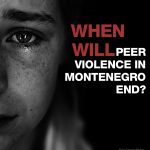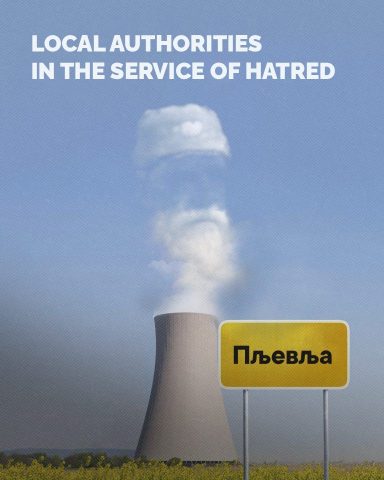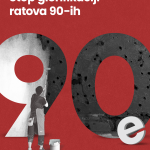The very title of the book, as well as its design, reveal its ideological intent: the cover features Pavle Đurišić, Draža Mihailović and Momčilo Đujić, the most well-known members of this quisling movement. The promotion is part of a disinformation campaign aimed at rehabilitating the Chetnik movement and covering up their crimes. This campaign also includes the erection of a monument to Pavle Đurišić, the increasing public singing of Chetnik songs, the organization of memorial services for collaborators – events which receive detailed media coverage – as well as the public glorification of Chetnik war criminals, routinely omitting key facts from their biographies.
The official organizer of this book promotion is the Committee for the Construction of the Church of Reconciliation, headed by dr Novica Stanić, a former independent MP and president of the Movement for Pljevlja. Stanić is known to the public for having called on members of his movement to pray for all Hague detainees, especially for the president of the Serbian Radical Party (SRS), Vojislav Šešelj.
The current local government, led by Dario Vraneš of the New Serbian Democracy (NSD) and the president of the Municipal Assembly Jovana Tošić from the Democrats, runs the municipality as if it were monoethnic, despite the fact that in Pljevlja, along with Serbs, live Montenegrins, Bosniaks, and members of other ethnic groups. Instead of fostering unity, the authorities are rehabilitating Chetnik ideology and downplaying the crimes committed against Bosniaks and Muslims.
Therefore, we believe it is important to recall historically established and undisputed facts. The Yugoslav Army in the Homeland was proclaimed by decree of King Peter II Karađorđević on 10 June 1942 and disbanded as a quisling formation by another decree of the same king on 29 August 1944, in which he revoked Mihailović’s command and called on the so-called “Yugoslav Army in the Homeland” to unconditionally join the National Liberation Partisan Detachments of Yugoslavia. The Chetniks ignored this call and fought against the Partisans until the end of the war, cooperating with the Ustasha and the Nazis and committed crimes aimed at the ethnic cleansing of the Muslim population. This dangerous ideology, resurrected in the 1990s, led to numerous mass crimes, including the genocide in Srebrenica.
Pljevlja also remembers Šešelj’s party member and Chetnik commander Milika Čeko Dačević, who led of paramilitary formations that controlled the town in mid-1992. At that time, 25 to 30 bomb attacks and explosions took place in Pljevlja, and in just one night, seven artisan shops owned by Muslims were set on fire. In the Pljevlja village of Bukovica, predominantly populated by Muslims, from 1992 to 1995, six people were killed, two committed suicide as a result of torture, 11 were abducted, around 70 were subjected to physical torture, and many were displaced. No one has been held accountable for these crimes.
Nationalism and hatred did not disappear after the wars of the 1990s, and in Pljevlja they gained new momentum following the 2020 elections. That period was marked by a series of nationalist outbursts, including the attack on Emir Pilav and his father, the smashing of windows of the Islamic Community building with the message “a black bird took off, Pljevlja will be Srebrenica” and public events glorifying war criminals. It is particularly shameful that the local government further fuel hatred and stoke nationalist tensions, using the money of all citizens – including those who are directly targeted – for events such as the celebration of Orthodox New Year 2024 on 13 July Square, which turned into a Chetnik ramping. All of this is happens with the tacit approval of parties that declare to be civic-oriented.
By hosting the promotion of this book in the Pljevlja Municipal Assembly, the local authorities are deepening divisions and further inciting hatred toward Bosniaks and Muslims. The Municipal Assembly must not be a place from which a message is sent that ethnic cleansing is something to be promoted and celebrated.
Non-governmental organizations and civic activists refuse to accept that the local government in Pljevlja is undermining the community and teaching new generations division and hatred through its actions. Such actions endanger security, and it is the responsibility of all of us who care about Montenegro to put a stop to it. We once again call on state authorities to take a firm stand against fascism, to condemn the promotion of hatred, and to finally ban it.
Daliborka Uljarević, Centre for Civic Education (CCE)
Tea Gorjanc Prelević, Human Rights Action (HRA)
Filip Kuzman, Antifascists of Cetinje
Ervina Dabižinović, Center for Women’s and Peace Education ANIMA
Milka Tadić Mijović, Center for Investigative Journalism of Montenegro (CIN CG)
Velija Murić, Montenegrin Committee of Lawyers for the Protection of Human Rights
Adnan Čirgić, Montenegrin PEN Center
Milena Popović Samardžić, Ipso Facto
Demir Ličina, Association Štrpci – Against Oblivion
Miloš Vukanović, Association of History Teachers of Montenegro – HIPMONT
Nevenka Vuksanović, Center for Democracy and Human Rights (CEDEM)
Maja Raičević, Women’s Rights Center
Aida Perović, Prima
Ivana Vujović, Juventas
Jovan Ulićević, Association SPECTRA
Zenepa Lika, Dr. Martin Schneider-Jacoby Association – MSJA
Slavica Striković, Women’s Action
Milica Kovačević, Center for Democratic Transition (CDT)
Zlatko Vujović, Center for Monitoring and Transition (CeMI)
Budimirka Mira Saveljić, Shelter
Zorana Marković, Center for Development of Non-Governmental Organizations (CRNVO)
Olivera Nikolić, Montenegrin Media Institute
Dina Bajramspahić, civic activist
Jovana Marović, civic activist
Paula Petričević, civic activist
Milena Bešić, civic activist
Nikoleta Đukanović, civic activist
Sabina Talović, civic activist
Milica Kankaraš Berber, civic activist
Dušan Pajović, civic activist










 English
English